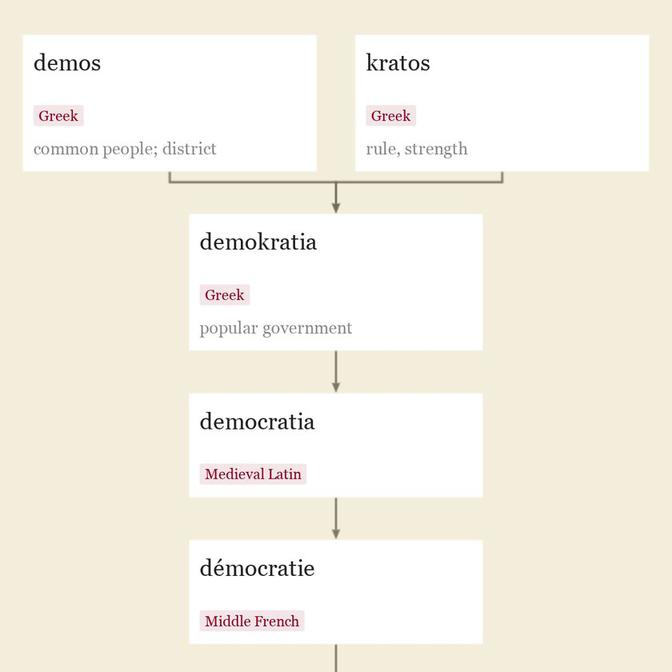democratize (v.)
1798年(及物动词)“使普及或普遍,使平民化; 使民主化”; 1840年(不及物动词)“变得民主化”,源自法语 démocratiser,被认为是革命时期的新词之一,来自 démocratie(参见 democracy)。希腊语 demokratizein 的意思是“站在民主一边”。
最早记录年份: 1798
democratize 的相关词汇
democracy (n.)

“民主政治,一种政治制度,主权权力归全体人民直接行使或通过选举产生的官员行使; 一种由此治理的国家,”1570年代,源自法语 démocratie(14世纪),源自中世纪拉丁语 democratia(13世纪),源自希腊语 dēmokratia “民众政治”,源自 dēmos “普通人民”,最初的意思是“地区”(见 demotic),加上 kratos “统治,力量”(见 -cracy)。
有时在16世纪至17世纪以拉丁化形式 democratie 出现。在19世纪的英格兰,它可以指“没有世袭或其他等级的人群,普通人民”。在19世纪的美国政治中,它可以意味着“民主党的原则或成员”。
Democracy implies that the man must take the responsibility for choosing his rulers and representatives, and for the maintenance of his own 'rights' against the possible and probable encroachments of the government which he has sanctioned to act for him in public matters. [Ezra Pound, "ABC of Economics," 1933]
民主意味着人们必须对选择他的统治者和代表以及维护自己的“权利”负责,以防止他已经授权代表他处理公共事务的政府可能和可能会侵犯他的权利。[埃兹拉·庞德,《经济学 ABC》,1933年]
democratization (n.)
"民主化的行动或过程; 使民主化的行为",1860年; 参见 democratize + -ation。
We teach the population at the cheapest possible rate; and the aim all the democratization (if we may use the word) of literature proposes to itself in this country, is to store the minds of the many, of the anonymous multitude, with a large portion of valuable, because practically useful, facts. [Meliora, vol. ii, no. 6, 1860]
我们以最便宜的价格教授人民; 在这个国家,文学的民主化(如果我们可以使用这个词)的目的是用大量有价值的、实用的事实来储存许多匿名的人群的思想。[Meliora,卷二,第六期,1860年]